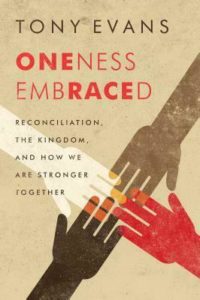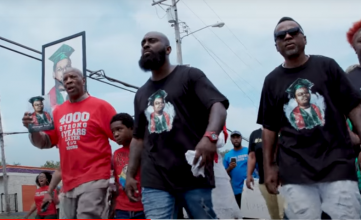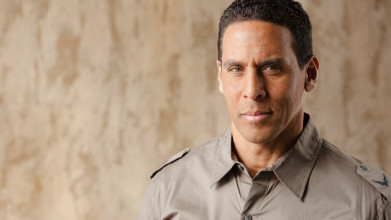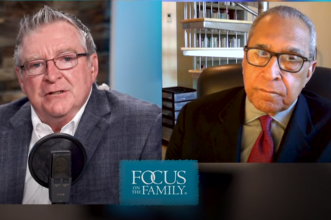Excerpt:
Dr. Shelby Steele: We are at a place now where we don’t need fancy, uh, interventions, we need those old-fashioned traditional values. The institution of marriage somehow has to be brought back into the black community as the centerpiece.
End of Excerpt
John Fuller: Dr. Shelby Steele uh, recently joined us for a really interesting conversation about racial division in America and offered some very helpful insights reminding us that broken families are at the center of the problems we all face. This is Focus on the Family with your host Focus president and author Jim Daly, and I’m John Fuller.
Jim Daly: John, last time Dr. Steele gave us a lot to think about as he shared some thought-provoking viewpoints about race relations. When we see incidents like the tragic death of George Floyd last year, things spiraled out of control and we see protests and violence around the country. We saw a similar response in Ferguson, Missouri a few years ago, and I went there to meet with Christian leaders after the death of Michael Brown. Um, you know, one of the things I found in that city, uh, whether you’re black or white, there was still quite a bit of unity about the town that they all share and the desire for everyone to build a better future, and that’s a good thing. Unfortunately, uh, tragedies like these tend to divide us in that moment. Uh, Dr. Shelby Steele has produced, uh, a new documentary called What Killed Michael Brown? And we’ll talk about that today. These issues are certainly controversial, I get that. Shelby doesn’t believe racism is a systemic problem like some of the media are pressing today, and I get it, other good people, uh, will believe there is a systemic problem, and that’s why we need to talk about all perspectives. But we all need to certainly take a deep breath, step back and learn to honor and respect one another as God commands us to do and have that good dialogue, not shout past one another. And I know Shelby agrees with that and there should be more that unites us, especially as Christians than divides us, and of course there’s always more work to be done.
John: Well, we do hope that you’ll find this to be really uh, thought provoking. Dr. Steele is a senior fellow at the Hoover Institution specializing in the study of race relations and multiculturalism and affirmative action. And if you missed it last time, we do have a CD or free download of that first part of this two-part conversation. Uh, just start by focusonthefamily.com/broadcast. Let’s go ahead and hear part two of the conversation on today’s episode of Focus on the Family as Jim asked Shelby about racial division along socioeconomic lines.
Jim: It seems to me, you know, I, I grew up in a poor family. I grew up in part in Compton, California. I spent third grade and part of fourth grade there. My point is, it seems to me that whether you’re white or black uh, social economic issues are shared across racial lines, and that actually may be higher on your list uh, that you’ve mentioned that the, the issue of poverty, the issue of lack of opportunity may be higher on that list. Am I assuming that, or would you agree with that?
Dr. Steele: Absolutely. Absolutely. Um, those are serious profound problems. Racism again is simply, it’s just not there.
Jim: Yeah. In the, in that regard, um, I think that’s where we may have the most hope of moving forward in the future, would you agree with that? Around the social economic areas where, uh, some parity can come to the black community in terms of earning and, and home ownership and all those kinds of things that actually make uh, life in America far better, correct?
Dr. Steele: If we stop thinking about ourselves, we as blacks stop thinking of ourselves constantly as victims, we can begin to do that tomorrow. The society is open to us, the society, every, almost every institution in America today practices racial preferences, gives blacks and minorities an advantage, try those out and tries to hire more, does, uh, go makes a show of it. So ag- again, that’s the poverty in the other hand is a, is a much deeper and more profound, uh, problem.
Jim: Dr. Shelby, you received a lot of your education if I have this correctly from, uh, East St. Louis, that was a tough neighborhood, perhaps one of the toughest in the country. Describe that experience, and what did you learn in that environment?
Dr. Steele: Well, I had, um, uh, again, as I said, I’ve been in, had been involved my parents before me in the civil rights movement and so forth. So, when I graduated from college, went to a small college in Iowa, Coe College, I wanted to be a part, I wanted to be in the front lines of social change. So President Johnson was coming out with the Great Society, the war on poverty, and, and, uh, I went to East St. Louis, Illinois, which was the, the, literally the poorest black community in America, like 97% of the population was on welfare. It was really poor and inner city; it was a sort of a precursor to the black underclass in America.
Jim: Mm-hmm (affirmative).
Dr. Steele: Family picked down drugs, crime, so forth, and we set up a school there. And so, I taught in that program for three years, and it was initiation for me. I began to, uh, while I was in college and I was the Black Middleton and the led the demonstrations in taking over the president’s office and all that sort of thing, uh, here suddenly was the naked reality, the real thing, um, re- the reality of black poverty in America. And it was the first time I had, uh, though I was poor, grew up poor and black, this was the, I had never seen anything quite like this, this sort of, uh, despairing-
Jim: Mm-hmm (affirmative).
Dr. Steele: … uh, and, and kind of, and heartbreaking. And, um, it was emotionally difficult to, uh, start in that situation. What I saw there though, there were some people who did some really good work. I didn’t, I tried my best to do some good work myself, but the people who ran the program and some of the, the teachers, so much money became available, uh, from the federal government that people began to suddenly they were driving a Mercedes to work.
Jim: Hmm.
Dr. Steele: Uh, suddenly things were, (laughs) we were writing, almost any grant we wrote would be funded. Uh, you just put East St. Louis there, the money would come-
Jim: Mm-hmm (affirmative).
Dr. Steele: … from the federal government especially. Um, so I, I began this, then other corruptions, uh, became self-evident, people would teach their class and meet once a month and say that, um, it was more important that kids learn from the streets than from books, uh, and give them college credit for this. And, uh, you can bend the rules, and, and, and so it became clear to me that after my, really after my first year, but I gave it two more years anyway, and I, I could see that this was, this was a hustle. There was no, there was no future.
Jim: Uh, how do you, how do you respond when you look at the amount of money that government, uh, since Lyndon Johnson and his programs back then, and America’s programs that had to be voted on by Congress, but it, uh, when you look at it objectively, it seems like there hasn’t been the gains that you would have hoped for after $22 trillion being spent to help people out of poverty. That example you just gave about East St. Louis is that what’s broken, is that why government is ineffective?
Dr. Steele: It’s, it’s worse than ineffective. It took the place of segregation and racism and slavery, that liberalism what the, what, is what you’re talking about became, and is today the new oppressor of black people. All those programs in the Great Society on, that I just mentioned the moment or so ago, all those programs have one thing in common. They have no faith in the people that are trying to help.
Jim: Hmm. Huh.
Dr. Steele: They don’t leave that black people can lift themselves up out of where they’re at. They disbelief, they are selling faithlessness to the people that they’re trying to help. And so the more programs weaker blacks get, the more family breakdown, uh, the more disoriented, almost, neorealist, uh, worlds that they create in, in many inner cities today where the normal rules of human behavior just simply disappear where thousands and thousands of people, of young kids are shot and killed every year. That’s a, a society overcome by nihilism, by meaninglessness, by hopelessness. So that, that is, that’s the problem, it, it, there are no white people in the inner city killing all those people.
Jim: But how, how do we turn that around, how do we get more awareness, how do we lower the death rate for black young men in the inner city so they’re not shot by other black men in that same inner city?
Dr. Steele: Focus on the family.
Jim: (laughs)
Dr. Steele: (laughs) But I mean, we’re at a place now where we don’t need fancy, uh, interventions, we need those old-fashioned traditional values. The institution of marriage somehow has to be brought back into the black community as the centerpiece. We have to find a way to celebrate marriage, to, to support people in that institution, uh, a- as they make this, they struggle to make their lives, as they raise their children. Child rearing, we need to focus on. Education, my goodness, we have the worst education system for blacks uh, in, in the world, yet education is really the only way up and out of poverty. Uh, so we need to ask more, we need more of those traditional family focused, religious focused. Uh, I, I believe that black church, uh, is, has to be one of the insti- the institution that really leads the way here, but those are the only things that are gonna, are going to work in a, in a positive sense it seems to me.
Jim: Shelby, when you look at the rage that we saw this past year with the death of Mr. Floyd, which was a travesty, and with the other deaths that you’ve talked about in terms of Michael Brown, it, there, there is a, a repeat scenario that occurs, a white officer shoots a, a black young man, and sometimes even the evidence isn’t sufficient that everybody jumps to conclusions, everyone’s, you know, concluding that that officer was guilty of racism. Sometimes that might be true, sometimes it’s not true, but again, uh, the culture just moves quickly to the conclusion that this was racially motivated. Speak to that reality, and then that rage that we’re seeing, the looting, all of the outcome of it. What do we need to understand as the white community about what’s happening there, because many people are scratching their head, they don’t see the linkage, they don’t get it. If a white officer shoots a, a African American young man, why are people then looting at Sears or, you know, some other store?
Dr. Steele: Well, it makes, it makes the point of how, um, fraudulent that impulse is that boils down to looting. There’s no, there’s no re- what’s interesting about incidents like that is that the trigger finger that shoots and kills the black teenager is white. If the trigger finger is black, you never hear about it. So one is, it’s uh, again, thousands and thousands and thousands. In, in 2016, there were, uh, in, uh, Chicago alone, there were 3,000 people shot in one single year. President Obama said almost nothing about it, no one came to the city. Michael Brown is shot uh, one kid in Ferguson, Missouri, and the whole world descends. The trigger finger in Michael Brown case was white, the trigger finger in Chicago, all those trigger fingers were black, that tells you where America sees power. The white trigger finger means white guilt, black trigger finger doesn’t touch white guilt. The white one does-
Jim: Hmm.
Dr. Steele: … and so it explodes. And, uh, we then the whole society goes into a convulsion and we renegotiate whether there’s racism or whether there isn’t racism and, and what we should… What we have lost as a society is the capacity to tell the truth, to look blacks in the face and say, where’s the racism, and what do you owe to yourself? How would you, uh, why would you allow yourself to live this way, to suffer in this way? You see what happens to your children.
Jim: Hmm.
Dr. Steele: It’s one of the things we tried to get to in the film, Michael Brown was the victim not of white racism, but of liberalism if anything that destroyed the institution of the family, it destroyed the public schools that he went to, the housing that he lived in. Every area of his life was defined by white guilt rather than by what he really needs, needed as a human being. He needed to be loved, he needed a father, he needed a stable family, he needed what everybody needs. That’s not racism, that’s liberalism.
Jim: Let me ask, uh, in the documentary, which again was really well done and you talked about Michael Brown in Ferguson, and that incident, you mentioned something that you called poetic truth versus objective truth, uh, describe those two and how they play out in the race issue.
Dr. Steele: Well, poetic truth is, is a narrative of an incident that serves mind leverage against white people. So here’s a black teenager walking down the street in the hot afternoon, policemen asking, please would he step onto the sidewalk, and this goes, escalates, goes onto where finally the policemen to save his own life has to shoot this, this poor kid, tragedy, uh, by any accounts, silly tragedy. When you have to do that, when you have to look at a situation like that, what happened in Ferguson was that right of way people began to say the trigger finger was white, the motivation was a racist, uh, racial animus, that this policeman hates black people and disregards the value of their lives and shoots and kills them, and so this proves Michael Browns death therefore proves that America is a systemically racist society. That’s why I call it poetic truth. It’s a complete distortion of the actual objective truth that serves my leverage as a black with larger white society. I can use Michael’s death to say, this proves that you really are guilty, and whites bring their hands and they anguish over this and so forth. Uh, and so the poetic truth is a grab for power, it’s an exercise for, for racial power and, uh, with race relations pretty much functions around the poetic truth that blacks are victims of white racism.
Jim: Right, right. And it’s so true. And I think that’s one of the core reasons this perspective that you have that I wanted to hear from you. But let’s look at the two futures, uh, the future that we continue on kind of the path we’ve been on with that idea of grievance and victimization, where does that go 60 years from now? We’re 60 years away from, uh, the Great Society and things of that nature and we’ve spent the 22 trillion trying to lift people up out of poverty, et cetera. And I think a fair assessment would be that we haven’t made, in some respects, we haven’t made much ground, but like you say, you feel racism has declined substantially, with outliers of course. But if we continue down the grievance victimization pathway, what does, what does the society look like with that continued polarization versus what could be the better future and how do we get there?
Dr. Steele: We have to stand up to the fact that, that, uh, this country has actually made some moral progress around racism, it’s not the, the barrier it once was. And then we have to, we have to, instead of just figuring out what to give minorities, we need to figure what to ask of minorities.
Jim: Huh.
Dr. Steele: There has to be an ask in here. And from this point on, if we wanna have a positive future as you put it, the, the only way to get there is to begin to ask for it, just spell it out to say, here’s what, you’re in freedom now, here’s the kind of level of responsibility one has to bear in freedom. One, you, you, you know, you can focus on the family and so forth, is, those, that, what you’re talking about there is how to make a, a family strong and healthy, and they’re gonna have to take a lot of responsibility, they’re gonna have to bear some burden. Well, that’s, is true for blacks as it is anyone else. So, if we’re gonna somehow get beyond this, this sort of pit that we fall and get out of this pit, we’re gonna have to ask blacks to take more… We as blacks have to get to the point that where we say, we are responsible for our fate entirely. And when, when America went to war at various points from the Revolutionary War on up, we said, that’s it, we have to, we have to go to the end, we have to give everything we’ve got. Well, I think black America is in that point, we, stop assuming the world is our enemy, most of the world is our friends these days. Uh, there’s an openness in America that is amazing. And I know it’s amazing because I remember when it wasn’t there. Uh, you know, I remember when blacks couldn’t play baseball (laughs) and I’d go back that far. Uh, well, that, you know, we, it’s, that’s not our problem anymore and we just have, have got to accept the, the responsibilities of freedom. Uh, don’t get married if you are not in a position to support a family. Don’t have, have children if you can’t raise them, if you’re not accounting for their development, if you’re not being responsible for them. You can’t ask society; they’ll never be able to do that. They’ve tried for 60 years now and we’re farther behind whites than we were in the 50s-
Jim: Well, yeah.
Dr. Steele: … by every socioeconomic measure.
Jim: That’s sadly the result, and that’s why your message is so intriguing about, um, self-respect and, you know, uh, being accountable, et cetera. In fact, in the documentary, there was a story a pastor gave about a mule in a well that you elaborated on in the documentary. Describe that for the listeners, what, what was said, and, and why was it so illustrative of the point you’re making right now?
Dr. Steele: Well, I love that point. Uh, it’s Pastor Corey Brooks is the, the minister in church right in the South side of Chicago, right in the Woodlawn area, which is the, the heart of uh, of the, the inner city. And he tells the story to his congregation farmer, uh, a mule falls into the well, and farmer comes, oh my God, my great mule is down there in the well, what am I going to do? And so he looks at the situation and he says, okay, what I will do is I will take, I will fill a truck full of garbage and dirt, (laughs) and I will dump the dirt and the garbage down in the well on top of the mule. So, he goes, he does exactly that. He goes and gets a truck he drops the, the, the dirt, the garbage on the mule, the mule sees and shakes off the, the garbage and steps up on the dirt and moves up. Farmer brings another load of garbage and dirt, mule does the same thing, shakes it off steps up, on and on and we go until the mule finally steps out of the well and into freedom. And so this is Pastor Brooks’ way of, of about talking about persistence, of taking a bad situation and making it good, of, of not asking for fancy, it’s dirt and garbage that the mule uses to free himself, to liberating himself. This is the metaphor that we as black Americans need to build an identity around, is that our, our ing- ingenuity in discovering possibilities to move ahead, rather than constantly using our inge- our creativity, to come up with ideas about how we co- we continue to be oppressed.
Jim: Hmm.
Dr. Steele: We’re, we’re, we’re, we’re poetic in talking about our, you know, uh, how victimized we are, how racist America is and on and on, uh, we’re poetic. No, let’s, we need to get and, and use a little garbage and dirt and move up and move into freedom.
Jim: Hmm.
Dr. Steele: Um, and again, I think a dangerous idea that blacks suffer from is justice. It’s the idea that we somehow can’t be motivated to move ourselves ahead, take responsibility until we get justice. That’s a delaying tactic. That’s a way of not facing uh, reality. We may or we may not get justice. The fact is, there’s a, as I say in, in the film, we will never get, ever, enough justice to somehow equate to all the suffering we endured for four centuries. There’s no pay off that, there’s no way that, that we’re gonna all, we’re gonna get a check and it’s gonna be repra- This is all, all illusion and it keeps us from seeing that we have to be the motivators, the activators, we have to do it ourselves, we, no matter what. God gave us life, He gave us infinite possibilities, despite history.
Jim: Hmm.
Dr. Steele: Uh, and our, and He’s asking us to take advantage of our freedom of our life. Um, we’re blessed. What is available to black Americans is, is the whole world. We are blessed, and, uh-
Jim: Hmm.
Dr. Steele: … we have to accept that we’re blessed and, and revel in that, and let that be a motivator.
Jim: Well, again, uh, Dr. Shelby Steele, you’ve brought some objective truth to this issue of race in America. I so appreciate it. I’d encourage people to watch the uh, documentary on Michael Brown and Ferguson. I think you bring a lot of truth to that scenario, and the reality that, uh, even with George Floyd that that was, uh, overt police brutality. And I think many people would agree with that. That’s the statement you make. Uh, thank you for being our guest here at Focus on the Family. Thank you for your emphasis on the importance of the family. We wake up every day coming into the offices here and uh, fighting for the family and for that importance of the family. Thank you for reinforcing that, and it’s good to have you on the program. Thank you.
Dr. Steele: Well, thank you. I enjoyed myself and I, I, I wish you and your focus, uh, all the best.
John: You know, Jim, I really found that to be a, a fascinating conversation, and I do hope that our listeners have been helped in some way. And certainly, we want to direct you uh, in our audience to some excellent resources on this topic.
Jim: John, I too appreciate Shelby’s insights and his admonishment to take a positive and thankful approach. That’s refreshing. Uh, he’s emphasized the importance of strengthening African American families through marriage and parenting, the need for educational opportunity, and for black churches to help lead the way. And then I think we all have a responsibility, I liked that point as well. I hope that you will pray and seek God about what He wants you to do, uh, to bridge any racial division that you may see right in your neighborhood, that begins uh, in your own heart and goes to your community. Uh, you know, when I think of Michael Brown, I wonder how things might’ve turned out differently if a good Christian man had come alongside him and mentored him, and maybe you could be that positive influence for another troubled youth. Also, there’s a great book I wanna encourage you to read on the subject from, uh, my good friend, Dr. Tony Evans. Uh, he was the first African American to graduate from Dallas Theological Seminary. Uh, his book, Oneness Embraced will challenge us to come together as brothers and sisters in Christ with the Bible as our guide. And I want to urge you to get it from us today.
John: Yeah. Dr. Evans is certainly a gifted communicator, and, uh, we’d love to send this book to you as our thank you gift when you join the support team, uh, make a donation of any amount today, and we’ll send that book, Oneness Embraced: Reconciliation, the Kingdom, and How We are Stronger Together. You can donate and get the book when you call 800-A-FAMILY, 800-232-6459, or you can donate at focusonthefamily.com/broadcast. And I’ll also mention the link we have for Shelby’s compelling documentary, What Killed Michael Brown?
Jim: And John, let me also say that we’ll continue these discussions about healing racial division. Uh, we’ll have future programs expressing various viewpoints and ideas to help us seek racial harmony that can only be found through Christ.
John: And I do hope you’ll find those beneficial as we come to those programs. On behalf of Jim Daly and the entire team here, thanks for listening to Focus on the Family today. I’m John Fuller inviting you back next time as we once again help you and your family thrive in Christ.






















